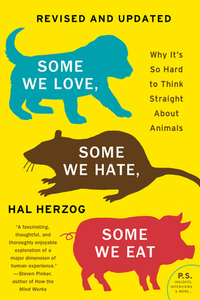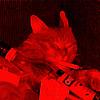Take a photo of a barcode or cover
171 reviews for:
Some We Love, Some We Hate, Some We Eat: Why It's So Hard to Think Straight About Animals
Hal Herzog
171 reviews for:
Some We Love, Some We Hate, Some We Eat: Why It's So Hard to Think Straight About Animals
Hal Herzog
Great book. Very thought provoking and it really made me question why I feel a certain way about animals. The cock fighting perspective was intriguing
This is a very thoughtful book. Hal Herzegovina comes to the issue of human relationships with animals from both an anthropological viewpoint and then examines the philosophical side of it. Ethic, morals and our own human irrationally enter this book. It starts out as a discussion of how humans regard animals and protect and use them. He examines our contradictory attitudes through his and other individuals actions and thoughts. We meet the people who raise and fight fighting cocks as the author examines how the mass produced chickens are raised. He talks to animal rights activists who would sacrifice an animal to save human lives but oppose rat studies which could save millions of lives. I found the book to be more of a study of cognitive dissonance and human contradictions than animals. Meat eaters, vegans and those in between will find something in this book.
This was a very interesting book. The author is a professor of psychology and specializes in human-animal relations. In this book he explores individual and cultural differences regarding our relationships to animals, including whether or not animals should have rights, and if so, where do we draw the line? (I.e. Do chimps and dolphins get rights? What about dogs & cats, mice, ants?) He explores scenarios such as a pet mouse being given love and care while a stray mouse in the house is caught in a snap trap, and Asian countries where people keep one breed of dog as a pet while eating another breed.
One of the most interesting chapters contrasted the supposedly evil owners of fighting cocks who pamper their roosters for the first two years of their life before sending them to possibly be killed in a fight with the culturally-supported practice of keeping meat chickens in overcrowded cages, never seeing any sunlight for the few months of their miserable lives before being roughly handled and slaughtered for the dinner table. The keepers of the fighting cocks are doing something illegal but the meat chickens are the ones who are truly suffering.
There are no "answers" in this book. What it does is point out that humans, by nature, are hypocritical creatures who say one thing and act a different way. And it really makes you think about your choices when it comes to food, pets, pests, ethics, and morals.
One of the most interesting chapters contrasted the supposedly evil owners of fighting cocks who pamper their roosters for the first two years of their life before sending them to possibly be killed in a fight with the culturally-supported practice of keeping meat chickens in overcrowded cages, never seeing any sunlight for the few months of their miserable lives before being roughly handled and slaughtered for the dinner table. The keepers of the fighting cocks are doing something illegal but the meat chickens are the ones who are truly suffering.
There are no "answers" in this book. What it does is point out that humans, by nature, are hypocritical creatures who say one thing and act a different way. And it really makes you think about your choices when it comes to food, pets, pests, ethics, and morals.
tl;dr version: A good read that forces readers to confront their hypocritical relationships with animals while assuring them that everyone is a hypocrite when it comes to animals. 8/10
For the full review, check out my blog! https://readonbro.tumblr.com/post/169445087544/some-we-love-some-we-hate-some-we-eat-why-its
For the full review, check out my blog! https://readonbro.tumblr.com/post/169445087544/some-we-love-some-we-hate-some-we-eat-why-its
I had recently just come across part of an interview on NPR with Hal Herzog and was pulled in by a story he told of having to boil animals for a lab project and immediately recognized something of myself in his description of how it was impossible to kill the mouse. I missed most of the interview but had caught enough that I was desperate to read the book by Dr. Herzog to hear more of his thoughts. I immediately ordered Some We Love, Some We Hate, Some We Eat and devoured it. This was one of those cases of the perfect book coming along into a person’s life at the perfect time. I had found myself recently struggling with a lot of the concepts and contradictions that are laid out in Some We Love, Some We Hate, Some We Eat.
Some We Love, Some We Hate, Some We Eat is an exploration in some of the major contradictions humans have in regards to their relationships with animals. This is a huge and heavy topic for sure and Dr. Herzog has spent his career studying this field. Dr. Herzog does a great job of breaking it down into more digestible segments. The book is heavy on philosophy and science, but not so heavy as to be unapproachable. In fact, I think Some We Love, Some We Hate, Some We Eat makes a great jumping off book for someone who's been looking to deepen their science reading but might have been fearful or intimidated to try “sciency” material. In actuality, I found the book to be more into philosophy than hard science. I was surprised by that, although I should not have been. When you are covering ethics and morals, you are naturally going to have to dive deep into the philosophy waters. There is an exceptionally large appendix of additional reading that could keep a person busy reading on both of these topics for quite some time.
The stand out chapter of Some We Love, Some We Hate, Some We Eat compares the treatment of chicken in cock-fighting versus the treatment of chicken raised for fast food. It is clear that this is the area of Dr. Herzog’s intimate expertise. In Dr. Herzog’s PhD research he went deep into the cock-fighting world and got an up close look and experience that most never will have. I do not want to give away the contents or try to persuade a reader's mind, but it is thought provoking and incredibly interesting.
I did a quick look at some of the other reviews of Some We Love, Some We Hate, Some We Eat and was surprised by some of the more critical reviews. After thinking about it for a week or so though, it makes sense. The topic that Hal Herzog has chosen for his life’s passion and career is an emotional one. The way people treat animals is riddled with contradictions. No one is comfortable when their own personal cognitive dissonance is pointed out. You see this is some of the passionate dismissals of the book. Additionally, animal rights is an incredibly heated topic with incredibly passionate advocates, some of whom review this book as accepting middle ground at times between hard choices, moral dilemmas, and personal contradictions.
Some We Love, Some We Hate, Some We Eat is a great science book and a great ethics book. This is a book that is meant to be slowly digested over time. You want to sit with what you have read and really think about it for long after. Some We Love, Some We Hate, Some We Eat is not a book that is meant to be read and instantly reacted to. It is also not a book to turn to if you are looking for answers. Dr. Herzog lays out the contradictions and it is up to the reader to think about them and deal with those in their own life accordingly.
Some We Love, Some We Hate, Some We Eat is an exploration in some of the major contradictions humans have in regards to their relationships with animals. This is a huge and heavy topic for sure and Dr. Herzog has spent his career studying this field. Dr. Herzog does a great job of breaking it down into more digestible segments. The book is heavy on philosophy and science, but not so heavy as to be unapproachable. In fact, I think Some We Love, Some We Hate, Some We Eat makes a great jumping off book for someone who's been looking to deepen their science reading but might have been fearful or intimidated to try “sciency” material. In actuality, I found the book to be more into philosophy than hard science. I was surprised by that, although I should not have been. When you are covering ethics and morals, you are naturally going to have to dive deep into the philosophy waters. There is an exceptionally large appendix of additional reading that could keep a person busy reading on both of these topics for quite some time.
The stand out chapter of Some We Love, Some We Hate, Some We Eat compares the treatment of chicken in cock-fighting versus the treatment of chicken raised for fast food. It is clear that this is the area of Dr. Herzog’s intimate expertise. In Dr. Herzog’s PhD research he went deep into the cock-fighting world and got an up close look and experience that most never will have. I do not want to give away the contents or try to persuade a reader's mind, but it is thought provoking and incredibly interesting.
I did a quick look at some of the other reviews of Some We Love, Some We Hate, Some We Eat and was surprised by some of the more critical reviews. After thinking about it for a week or so though, it makes sense. The topic that Hal Herzog has chosen for his life’s passion and career is an emotional one. The way people treat animals is riddled with contradictions. No one is comfortable when their own personal cognitive dissonance is pointed out. You see this is some of the passionate dismissals of the book. Additionally, animal rights is an incredibly heated topic with incredibly passionate advocates, some of whom review this book as accepting middle ground at times between hard choices, moral dilemmas, and personal contradictions.
Some We Love, Some We Hate, Some We Eat is a great science book and a great ethics book. This is a book that is meant to be slowly digested over time. You want to sit with what you have read and really think about it for long after. Some We Love, Some We Hate, Some We Eat is not a book that is meant to be read and instantly reacted to. It is also not a book to turn to if you are looking for answers. Dr. Herzog lays out the contradictions and it is up to the reader to think about them and deal with those in their own life accordingly.
This was a fascinating look at our relationship with animals. Well-researched and well-reasoned, the book gives the readers a great deal to contemplate.
It took me a while to read this book since I kept it in my office and would read on my lunch breaks. I found it to be very interesting, informative and written in a way that everyone can understand what Herzog is talking about. He writes in a way that even though he is telling you statistics and facts, it's like he is talking to you personally, rather than to the scientific community. I liked when he's throw in bits about his personal life, such as his cat Tilly.
While Herzog is not a vegan, I thought his portrayal of vegans and animal rights actives was positive and accurate.
I recommend this book to anyone who cares about animals.
While Herzog is not a vegan, I thought his portrayal of vegans and animal rights actives was positive and accurate.
I recommend this book to anyone who cares about animals.
This book was hard for me to get through because so many of the real-life examples were difficult to get through. There definitely wasn't an 'answer' at the end of the book, it was more of a collection of questions. Worth the time and energy it took to answer the questions myself.



